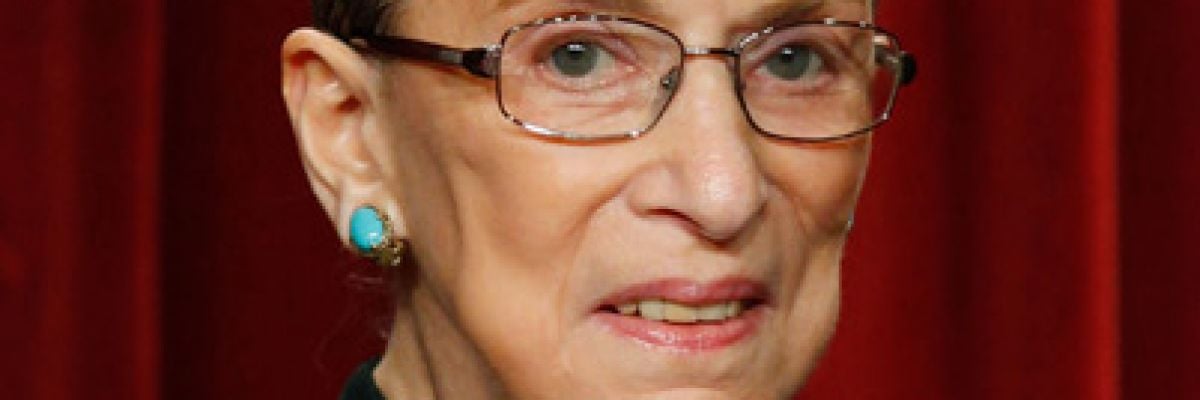
Supreme Court justice Ruth Bader Ginsburg recently commented on the infamous Roe v. Wade decision in a way that may shed light on how she—and the Court—will rule in the cases involving homosexual “marriage” that are currently before the Court.
According to the Associated Press:
One of the most liberal members of the U.S. Supreme Court, Justice Ruth Bader Ginsburg, could be expected to give a rousing defense of Roe v. Wade in reflecting on the landmark vote 40 years after it established a nationwide right to abortion.
Instead, Ginsburg told an audience Saturday at the University of Chicago Law School that while she supports a woman’s right to choose [note the biased language in the AP reporting], she feels the ruling by her predecessors on the court was too sweeping and gave abortion opponents a symbol to target. Ever since, she said, the momentum has been on the other side, with anger over Roe fueling a state-by-state campaign that has placed more restrictions on abortion.
Furthermore:
Four decades later, abortion is one of the most polarizing issues in American life, and anti-abortion activists have pushed legislation at the state level in an effort to scale back the 1973 decision.
Ginsburg would have rather seen the justices make a narrower decision that struck down only the Texas law that brought the matter before the court. That law allowed abortions only to save a mother’s life.
A more restrained judgment would have sent a message while allowing momentum to build at a time when a number of states were expanding abortion rights, she said. She added that it might also have denied opponents the argument that abortion rights resulted from an undemocratic process in the decision by “unelected old men.”
Ginsburg told the students she prefers what she termed “judicial restraint” and argued that such an approach can be more effective than expansive, aggressive decisions.
I am glad that she has discovered the value of judicial restraint on this issue.
Would that the nation and the more than 50,000,000 unborn children killed by abortion been spared the cost of this lesson.
What about homosexual “marriage”?
Currently the Supreme Court is weighing two cases, one of which involves California’s Prop 8, which defines marriages as between a man and a woman.
The second involves the 1996 Defense of Marriage Act (DOMA), which was signed by Bill Clinton and which prevents federal marriage benefits from going to same-sex unions and which also protects states from being forced to recognize homosexual marriages performed in other states.
It has long been noted that the Court’s ruling on these two cases could be as momentous as Roe v. Wade.
What’s interesting here is the reasoning that Ginsburg applied to Roe, because it tells us something about how the Court may rule on the homosexual marriage cases.
Indeed, she may have commented the way she did specifically to hint at this.
Similar situations, similar reasoning
Although Ginsburg did not comment on the cases currently before the Court (and one would not expect her to do so; justices are notoriously tight-lipped about current cases), both Roe and the Prop 8/DOMA cases involve similar situations.
- In both cases there is an alleged civil right being advanced on the part of “minorities” (women were viewed as a “minority” in 1973, though they were actually the majority of the population; homosexuals were and are a minority today).
- This “right” was contrary to Christian morality.
- This “right” was not provided for in existing American law.
- This “right” was widely opposed by the American public.
By imposing the civil right to abortion, the Supreme Court polarized opposition to it and landed us in the long struggle in whcih we find ourselves.
Imposing a similar right to homosexual marriage stands to do the same thing.
The reasoning that Ginsburg applied to Roe would apply to the Prop 8/DOMA cases as well.
Presumably, she sees this and, if so, it is revealing of how she may vote.
What her reasoning would imply
Specifically, she may favor narrower rulings on Prop 8 and DOMA that leave the broader question of homosexual marriage unaddressed.
In the case of Prop 8, she may favor striking it down. This would legalize homosexual marriage in California but not elsewhere.
Since the California State Supreme Court has already effectively ruled against Prop 8, and since the U.S. Supreme Court generally defers to state supreme courts on matters of state law, the legal reasoning behind this would not be unexpected.
The logic she applied to Roe would suggest not tampering with DOMA, though, because that would have national effects.
Or, she might favor targeting specific aspects of DOMA in a narrower way (e.g., allowing the federal government to extend benefits to homosexual marriages but not requiring states to recognize them).
A Long National Struggle
Whether or not the Court ultimately crafts a broad or a narrow set of rulings on these cases, we’re still in for a long national struggle concerning homosexual marriage.
The subject is not going to go away. What remains to be seen is whether we will be put in Roe-like position by the Court or whether we will hold more ground than that.
Either way, we must start educating people on this subject.
That’s why Catholic Answers has produced the booklet Why Homosexual Unions Are Not Marriages.



